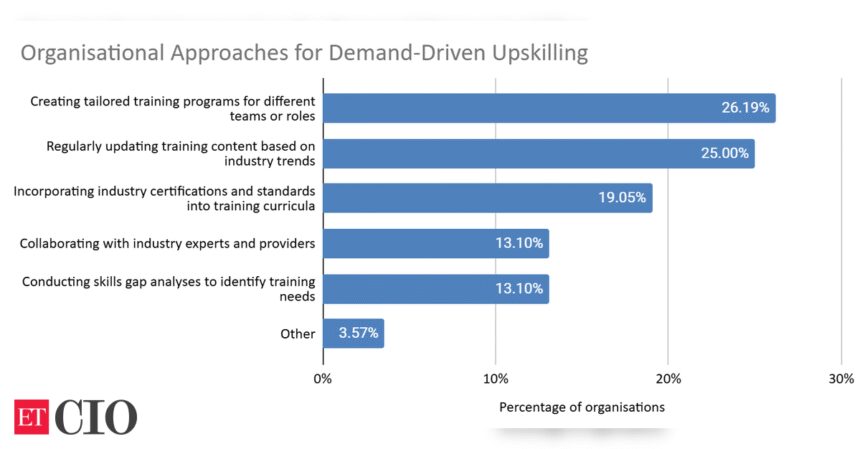Great Learning for Business, the enterprise training division of Great Learning, reports that companies are increasingly focusing on training mid- and senior-level employees in response to the growing impact of AI in the workplace. This strategic pivot aims to enhance innovation and leadership capabilities, ensuring that organizations are prepared for both immediate challenges and long-term growth. These insights were gathered from Learning and Development (L&D) leaders and Business Unit (BU) heads across various sectors.
In terms of workforce training priorities for FY26, Artificial Intelligence (AI) and Generative AI (GenAI) training have become critical, extending beyond traditional IT teams. Approximately 48% of organizations prioritizing AI training are from the IT & IT-Enabled Services (IT/ITeS) sector, followed by 14% from Manufacturing & Supply Chain, and 10% each from Banking, Financial Services & Insurance (BFSI) and Healthcare & Pharmaceuticals. The IT/ITeS sector also leads in the focus on Data Science and Analytics, comprising 47% of organizations in this category, while BFSI accounts for 21%, and both Professional Services and Manufacturing & Supply Chain represent 11% each. Additionally, 50% of organizations recognize the importance of Cybersecurity and Risk Management, underscoring the vital role that technical skills play across all functions of an enterprise.
Enterprises are refining their L&D strategies to enhance employee retention and growth. About 26% tailor training programs to specific roles, linking training directly to career progression, while 25% update content to reflect emerging trends. Moreover, 19% of organizations emphasize industry certifications to provide employees with recognized credentials. Investments in external collaborations and regular skills-gap analyses stand at 13% each, promoting a culture of continuous adaptation.
In FY25, the demand for training mid-level employees soared, more than doubling from 15% in FY24 to 35%. This indicates a shift toward focusing on those who bridge execution and leadership roles. Companies are investing in developing mid-level professionals with advanced skills, essential for driving innovation and translating company strategies into effective outcomes. Likewise, the demand for senior-level training also doubled, highlighting an intentional emphasis on strengthening leadership pipelines and succession planning. This reflects a growing understanding that organizational growth is reliant not just on new talent but on resilient leaders who can navigate technological changes and market disruptions.
In FY24, over 80% of Great Learning’s enterprise training programs were directed toward early-career professionals. However, a temporary decline in this area occurred during FY25 due to economic uncertainties that led many organizations to scale back large-scale entry-level onboarding, particularly in the tech sector. As FY26 progresses, a strong rebound is evident, with organizations once again prioritizing foundational talent. Current data indicates that thousands of early-career professionals have been trained in the first half of FY26, with a significant focus on skills such as AI and Generative AI, aligning with the rapidly changing market demands.
To enhance learning outcomes, over 40% of organizations now conduct skills-gap assessments on a quarterly basis, while another 22% do so annually. This regular assessment ensures that L&D budgets align with evolving business needs, enabling companies to identify capability gaps and prioritize investments effectively. This data-driven approach transforms learning from a compliance task into a strategic growth driver, allowing L&D leaders to accomplish measurable improvements from training investments.
Ritesh Malhotra, Enterprise Head at Great Learning, stated, “As AI and emerging technologies reshape the landscape of work, we see a decisive shift in business priorities. Enterprises are focusing on internal talent development over traditional hiring, aiming to cultivate agile, future-ready workforces across all levels. With our Gen AI Academy, our tech-enabled products are designed to empower non-technical teams to enhance their prompt engineering skills. We also develop tailored learning solutions for advanced AI practitioners working with Agentic systems to foster greater efficiency.”
The article concludes with a publication date of October 23, 2025.










